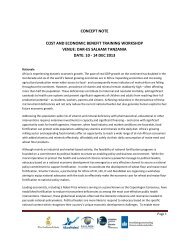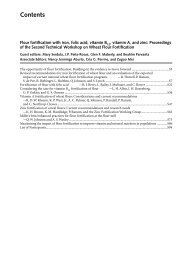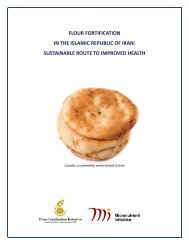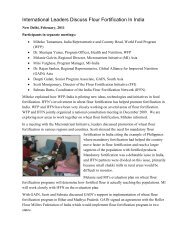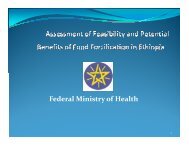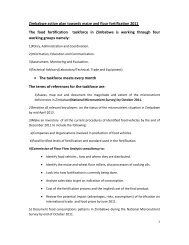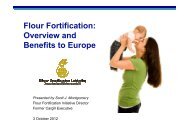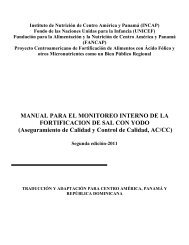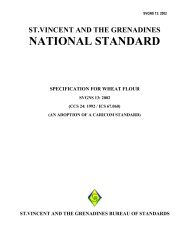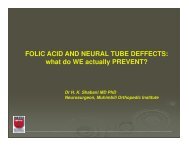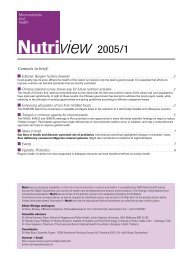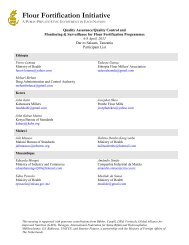ALINORM 99/23 (E) - CODEX Alimentarius
ALINORM 99/23 (E) - CODEX Alimentarius
ALINORM 99/23 (E) - CODEX Alimentarius
Create successful ePaper yourself
Turn your PDF publications into a flip-book with our unique Google optimized e-Paper software.
<strong>ALINORM</strong> <strong>99</strong>/<strong>23</strong> Page 4CRITERIA FOR EVALUATING ACCEPTABLE METHODS OF ANALYSIS FOR <strong>CODEX</strong>PURPOSES (Agenda Item 5) 619. The Committee recalled that it had first considered this issue formally at its 19th Session. TheCommittee at its 20th Session (1<strong>99</strong>5) had accepted the criteria-based approach in principle and agreed todraw up detailed working guidelines for its operation including the definitions and selection of thecriteria to be used. The Committee at its last session had agreed that the paper should be revised by theDelegations of Canada, France and the United Kingdom and that trade dispute situations should also beaddressed. The Committee agreed to discuss matters regarding trade dispute situations separately fromthe criteria approach at its present Session.20. The Delegation of the United Kingdom presented the referenced paper 7 and explained that theobjective of the criteria approach was to simplify the endorsement procedure for methods of analysis forchemical entities, and to provide for flexibility in selecting methods of analysis for such analytes. It wasstated that the quality standard of analytical laboratories and the way in which they operate haddramatically changed due to quality assurance systems such as proficiency testing and accreditation. Hestressed that the criteria approach was not intended to downgrade methods of analysis. Given thecurrent confusion caused by the existence of multiple Type III methods, the Delegation urged theCommittee to proceed with the criteria approach and proposed amendments to the relevant sections ofthe Codex <strong>Alimentarius</strong> Commission Procedural Manual in order for this Committee to implement thecriteria approach.21. The Committee confirmed its previous general acceptance of the criteria approach for methodsof analysis for chemical entities. A majority of delegations wished to proceed with the approach. Anumber of delegations stated that only methods validated through inter-laboratory studies should beused and that analytical laboratories should be operating under quality assurance systems and/or goodlaboratory practices.22. Many delegations expressed their preference of the criteria approach for flexibility it provided,in respect of the selection of methods or the availability of equipment. It was also stated that in order toachieve better results of analyses, it was desirable to be allowed to use those methods in which analystswere experienced. The Delegation of Ireland presented their experience in using both official methodsand the criteria approach. It was stated that, if backed up by an appropriate quality assurance system, thecriteria approach was found suitable to be used also in court. The Delegation stated that in the futuremore labs would seem to use the criteria approach.<strong>23</strong>. Some delegations proposed that the Codex method Types II and III should be combined toprovide for more flexibility. However, several other delegations were in favour of retaining the Type IIclassification stating the usefulness of these reference methods in relation to trade disputes or for use inthe validation of alternative (automated) methods or calibration of new methods. The Committee for thetime being did not wish to change the method classification.24. Concerns were expressed on the number and selection of criteria to be used in this approach.The Committee recalled that it had already agreed that this Committee would convert methods proposedby the commodity committee into criteria. Some delegations and observers questioned the need fornine criteria which could lead to a possibility to exclude appropriate methods from selection for Codexpurposes due to trivial criteria (see para. 66) or could necessitate redesigning of collaborative studies.Some delegations proposed to change the terms for certain criteria and to identify some of them asoptional.67CX/MAS 98/5, CRD 13 (comments from Argentina), CRD 17 (comments from Russia); CRD 20 (commentsfrom AOAC International); comments from Brazil.Except for its Annex IV.



